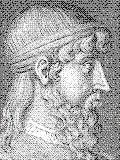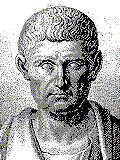


Between 367 B.C. and 347 B.C.,
Plato, as the teacher, and
Aristotle, as the student,
formalized and legitimized the
Form and Substance
of Reasoning by
![]() .
In doing so, they essentially realized
a shift of consciousness from a chaotic,
mysterious universe to an ordered,
predictable world of cause and effect.
All of Western Civilization is a corollary to this event.
.
In doing so, they essentially realized
a shift of consciousness from a chaotic,
mysterious universe to an ordered,
predictable world of cause and effect.
All of Western Civilization is a corollary to this event.
In 429 B.C., plague killed at least one-third the population of Athens. In turn, the good citizens of Athens lost their fear of their Gods and Goddesses, because
There is a brief chronology of other events which immediately preceded the discussions of Form and Substance. With the memory of the plague clearly in mind, the citizens began to seek a real understanding of how things worked. It was a matter of life and death!
Towards this end, Plato postulated a "World of Ideas", independent of any gods or goddesses. At the time, such independence implied an absolute quality that neither God nor Goddess could change, now or forever.
In later the later years,
Aristotle
argued on the genesis of
![]() ,
and discussed various Categories of
,
and discussed various Categories of
![]() .
His teachings were highly regarded and inspired much
research and understanding after
his death in 322 B.C.
.
His teachings were highly regarded and inspired much
research and understanding after
his death in 322 B.C.
Unfortunately, this focus on absolute permanence ultimately lead to 1500 years of paralysis under the dominion of the Vatican. However, even with a price tag of 1500 years, Plato's work must be appreciated as only the first cut at freeing humanity from the arbitrary whims of supernatural forces.
As we now know, Aristotle was "wrong" about a lot of things, but, hey, that was almost 2500 years ago and syllogisms were the hi-tech of the day. To get a flavor for the consciousness of the Form and Substance of Objects, consider the following chronology of events in Ancient Greece, for the 100 years, or so, immediately before Plato and Aristotle held their discussions:

Plato
427(?)–347 B.C.
In 407 B.C. Plato became a pupil and friend of Socrates. In 387 B.C., after living for a time at the Syracuse court, Plato founded the most influential school of the ancient world, The Academy, near Athens, where he taught until his death.
His most famous pupil there was Aristotle. Plato's extant work is in the
![]() of epistles and dialogues, divided according to the probable order of composition.
of epistles and dialogues, divided according to the probable order of composition.
The early, or Socratic, dialogues, e.g., the Apology, Meno, and Gorgias, present Socrates in conversations that illustrate his major ideas—the unity of virtue and knowledge and of virtue and happiness. They also contain Plato's moving account of the last days and death of Socrates.
Plato's goal in dialogues of the middle years, e.g., the Republic, Phaedo, Symposium, and Timaeus, was to show the rational relationship between the soul, the state, and the cosmos.
The later dialogues, e.g., the Laws and Parmenides, contain treatises on law, mathematics, technical philosophic problems, and natural science.
Plato regarded the rational soul as immortal, and he believed in a world soul and a Demiurge, the creator of the physical world.
He argued for the independent reality of Ideas, or
![]() s,
as the immutable archetypes of all temporal phenomena and as the only guarantee of ethical standards and of objective scientific knowledge.
s,
as the immutable archetypes of all temporal phenomena and as the only guarantee of ethical standards and of objective scientific knowledge.
Virtue consists in the harmony of the human soul with the universe of Ideas, which assure order, intelligence, and pattern to a world in constant flux.
Supreme among them is the Idea of the Good as an
![]() to the sun in the physical world.
Only the philosopher, who understands the harmony
of all parts of the universe with the Idea of the Good,
is capable of ruling the just state.
to the sun in the physical world.
Only the philosopher, who understands the harmony
of all parts of the universe with the Idea of the Good,
is capable of ruling the just state.
In Plato's various dialogues he touched upon virtually every problem that has occupied subsequent philosophers; his teachings have been among the most influential in the history of Western civilization, and his works are counted among the world's finest literature.

Aristotle
384-323 B.C.
Aristotle was born in 384 B.C. at Stagira, a Greek colonial village on the Aegean Sea near the Macedonian border. In 367, Aristotle entered the Academy at Athens. At the time, Plato was sixty-one years of age, and began a friendship that lasted for twenty years until Plato's death in 347.
After Plato's death, Aristotle left the Academy and later studied natural history and marine biology for two years on the island of Lesbos until 344. He then returned to the Macedonian court to tutor Alexander The Great from 342 to 339. When Alexander later made his expedition to the East, he appointed men to collect materials and specimens to further Aristotle's scientific research.
In 335 he opened a school, called The Lycaeum, in Athens. The great body of extant Aristotlean treatises probably represent the lectures which Aristotle delivered at The Lycaeum.
In 330 B.C., also addressing the
![]() of matter, the atomic theory of the Greek philosopher Democritus
says that all matter is composed of tiny atomic particles.
Nothing happens through chance or intention, says Democritus;
everything happens through cause and of necessity.
All change is merely an aggregation or separation of parts,
nothing which exists can be reduced to nothing,
and nothing can come out of nothing.
Democritus distinguished between vertebrate and invertebrate animals,
both of which he dissected.
of matter, the atomic theory of the Greek philosopher Democritus
says that all matter is composed of tiny atomic particles.
Nothing happens through chance or intention, says Democritus;
everything happens through cause and of necessity.
All change is merely an aggregation or separation of parts,
nothing which exists can be reduced to nothing,
and nothing can come out of nothing.
Democritus distinguished between vertebrate and invertebrate animals,
both of which he dissected.
During the anti-Macedonian agitation after Alexander's death in 323, Aristotle fled to Chalcis, where he died a few months later in 322.
In his philosophical system, theory following empirical observation, and logic based on syllogisms, is the essential method of rational inquiry. He profoundly influenced Western thought and his extant writings, largely in the
![]() of lecture notes made by his students at The Lycaeum, include:
of lecture notes made by his students at The Lycaeum, include:
An archive of his complete works is available. Robin Smith of Texas A&M University Philosophy Department is a leading authority on his works.
Aristotle held philosophy to be the discerning,
through the use of systematic logic as expressed in syllogisms,
of the self-evident, changeless first principles that
![]() the basis of all knowledge.
the basis of all knowledge.
He taught that knowledge of a thing requires an inquiry into causality and that the "final cause" — the purpose or function of the thing — is primary. The highest good for the individual is the complete exercise of the specifically human function of rationality.
Aristotle's work was lost following the decline of Rome but was reintroduced to the West through the work of Arab and Jewish scholars, becoming the basis of medieval Scholasticism.
Today, on the Web, you can visit the modern day Aristotle University of Thessaloniki.
Afterwards, this wave of discovery and rationality propagated throughout the known world and saw that:
noun
[Middle English silogisme, from Old French, from Latin syllogismus, from Greek sullogismos, from sullogizesthai, to infer : sun-, syn- + logizesthai, to count, reckon (from logos, reason).]